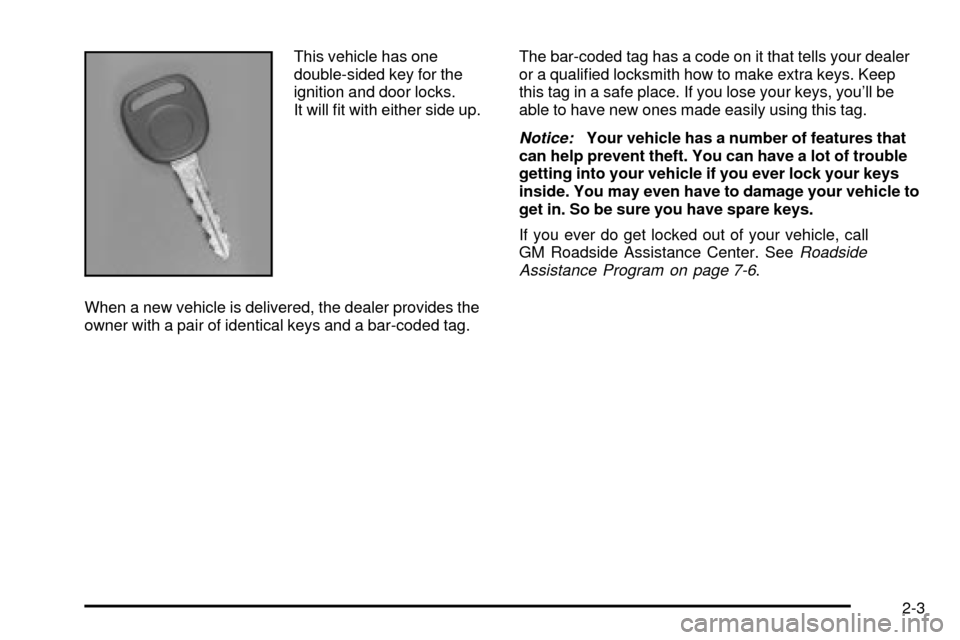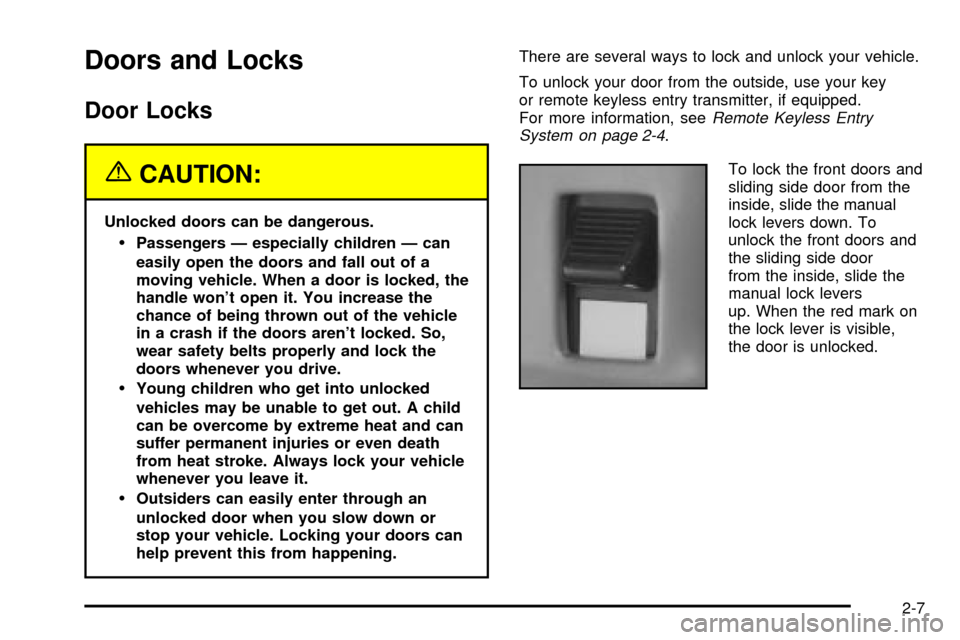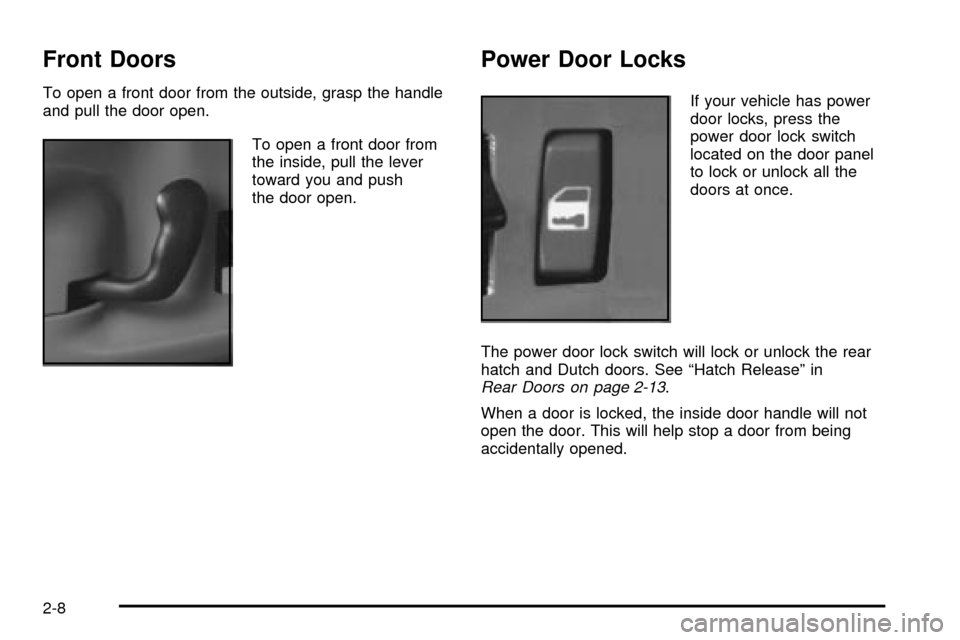2003 CHEVROLET ASTRO CARGO VAN door lock
[x] Cancel search: door lockPage 1 of 382

Seats and Restraint Systems........................... 1-1
Front Seats
............................................... 1-2
Rear Seats
............................................... 1-7
Safety Belts
.............................................1-13
Child Restraints
.......................................1-35
Air Bag System
.......................................1-62
Restraint System Check
............................1-71
Features and Controls..................................... 2-1
Keys
........................................................ 2-2
Doors and Locks
....................................... 2-7
Windows
.................................................2-16
Theft-Deterrent Systems
............................2-18
Starting and Operating Your Vehicle
...........2-19
Mirrors
....................................................2-32
HomeLink
žTransmitter
.............................2-34
Storage Areas
.........................................2-38
Instrument Panel............................................. 3-1
Instrument Panel Overview
.......................... 3-2
Climate Controls
......................................3-18
Warning Lights, Gages and Indicators
.........3-23
Audio System(s)
.......................................3-38
Driving Your Vehicle....................................... 4-1
Your Driving, the Road, and Your Vehicle
..... 4-2Towing
....................................................4-29
Service and Appearance Care.......................... 5-1
Service
..................................................... 5-3
Fuel
......................................................... 5-5
Checking Things Under the Hood
...............5-11
All-Wheel Drive
........................................5-52
Rear Axle
...............................................5-53
Front Axle
...............................................5-54
Bulb Replacement
....................................5-55
Windshield Wiper Blade Replacement
.........5-62
Tires
......................................................5-63
Appearance Care
.....................................5-83
Vehicle Identi®cation
.................................5-91
Electrical System
......................................5-92
Capacities and Speci®cations
.....................5-99
Normal Maintenance Replacement Parts
....5-101
Maintenance Schedule..................................... 6-1
Maintenance Schedule
................................ 6-2
Customer Assistance Information.................... 7-1
Customer Assistance Information
.................. 7-2
Reporting Safety Defects
...........................7-10
Index.................................................................1
2003 Chevrolet Astro Owner ManualM
Page 24 of 382

Q:If I'm a good driver, and I never drive far from
home, why should I wear safety belts?
A:You may be an excellent driver, but if you're in an
accident ± even one that isn't your fault ± you and
your passengers can be hurt. Being a good
driver doesn't protect you from things beyond your
control, such as bad drivers.
Most accidents occur within 25 miles (40 km) of
home. And the greatest number of serious injuries
and deaths occur at speeds of less than 40 mph
(65 km/h).
Safety belts are for everyone.
How to Wear Safety Belts Properly
This part is only for people of adult size.
Be aware that there are special things to know about
safety belts and children. And there are different
rules for smaller children and babies. If a child will be
riding in your vehicle, see
Older Children on page 1-35orInfants and Young Children on page 1-38. Follow
those rules for everyone's protection.
First, you'll want to know which restraint systems your
vehicle has.
We'll start with the driver position.
Driver Position
This part describes the driver's restraint system.
Lap-Shoulder Belt
The driver has a lap-shoulder belt. Here is how to wear
it properly.
1. Close and lock the door.
2. Adjust the seat so you can sit up straight. To see
how, see ªSeatsº in the Index.
1-18
Page 79 of 382

Keys...............................................................2-2
Remote Keyless Entry System.........................2-4
Remote Keyless Entry System Operation...........2-5
Doors and Locks.............................................2-7
Door Locks....................................................2-7
Front Doors...................................................2-8
Power Door Locks..........................................2-8
Programmable Automatic Door Locks................2-9
Leaving Your Vehicle....................................2-10
Sliding Side Door..........................................2-10
Rear Doors..................................................2-13
Windows........................................................2-16
Manual Windows..........................................2-16
Power Windows............................................2-17
Sun Visors...................................................2-17
Theft-Deterrent Systems..................................2-18
Passlock
ž....................................................2-18
Starting and Operating Your Vehicle................2-19
New Vehicle Break-In....................................2-19
Ignition Positions..........................................2-19
Starting Your Engine.....................................2-21Engine Coolant Heater..................................2-22
Automatic Transmission Operation...................2-23
All-Wheel Drive............................................2-26
Parking Brake..............................................2-26
Shifting Into Park (P).....................................2-27
Shifting Out of Park (P).................................2-29
Parking Over Things That Burn.......................2-30
Engine Exhaust............................................2-30
Running Your Engine While You Are Parked. . . .2-31
Mirrors...........................................................2-32
Manual Rearview Mirror.................................2-32
Outside Manual Mirror...................................2-32
Outside Power Mirrors...................................2-32
Outside Convex Mirror...................................2-33
HomeLink
žTransmitter...................................2-34
Programming the HomeLinkžTransmitter.........2-35
Storage Areas................................................2-38
Overhead Console........................................2-39
Luggage Carrier...........................................2-44
Convenience Net..........................................2-45
Section 2 Features and Controls
2-1
Page 81 of 382

This vehicle has one
double-sided key for the
ignition and door locks.
It will ®t with either side up.
When a new vehicle is delivered, the dealer provides the
owner with a pair of identical keys and a bar-coded tag.The bar-coded tag has a code on it that tells your dealer
or a quali®ed locksmith how to make extra keys. Keep
this tag in a safe place. If you lose your keys, you'll be
able to have new ones made easily using this tag.
Notice:Your vehicle has a number of features that
can help prevent theft. You can have a lot of trouble
getting into your vehicle if you ever lock your keys
inside. You may even have to damage your vehicle to
get in. So be sure you have spare keys.
If you ever do get locked out of your vehicle, call
GM Roadside Assistance Center. See
Roadside
Assistance Program on page 7-6.
2-3
Page 83 of 382

Remote Keyless Entry System
Operation
If your vehicle has this feature, you can lock and unlock
your doors from about 3 feet (1 m) up to 30 feet
(9 m) away using the remote keyless entry transmitter
supplied with your vehicle.
UNLOCK:Press UNLOCK
once for the driver's door to
unlock, the parking lamps
to ¯ash and the interior
lights to go on.
If you press UNLOCK again within three seconds, all
doors will unlock.LOCK:Press LOCK to lock all the doors. Press LOCK
again within three seconds and the horn will chirp.
REAR 2X:Press the REAR button twice within three
seconds to unlock the rear hatch or cargo doors.
The parking lamps will ¯ash and the interior lights will
go on. If the engine is running, the automatic
transmission must be in PARK (P) or NEUTRAL (N) for
the REAR 2X button to operate.
L(Panic Alarm):Press this button for the horn to
sound and the headlamps and taillamps to ¯ash for up to
30 seconds. This can be turned off by pressing the
panic button again, waiting for 30 seconds, or starting
the vehicle.
Matching Transmitter(s) to Your
Vehicle
Each remote keyless entry transmitter is coded to
prevent another transmitter from unlocking your vehicle.
If a transmitter is lost or stolen, a replacement can
be purchased through your dealer. Remember to bring
any remaining transmitters with you when you go to
your dealer. When the dealer matches the replacement
transmitter to your vehicle, any remaining transmitters
must also be matched. Once your dealer has coded the
new transmitter, the lost transmitter will not unlock
your vehicle. Each vehicle can have a maximum of four
transmitters matched to it.
2-5
Page 85 of 382

Doors and Locks
Door Locks
{CAUTION:
Unlocked doors can be dangerous.
·Passengers Ð especially children Ð can
easily open the doors and fall out of a
moving vehicle. When a door is locked, the
handle won't open it. You increase the
chance of being thrown out of the vehicle
in a crash if the doors aren't locked. So,
wear safety belts properly and lock the
doors whenever you drive.
·Young children who get into unlocked
vehicles may be unable to get out. A child
can be overcome by extreme heat and can
suffer permanent injuries or even death
from heat stroke. Always lock your vehicle
whenever you leave it.
·Outsiders can easily enter through an
unlocked door when you slow down or
stop your vehicle. Locking your doors can
help prevent this from happening.There are several ways to lock and unlock your vehicle.
To unlock your door from the outside, use your key
or remote keyless entry transmitter, if equipped.
For more information, see
Remote Keyless Entry
System on page 2-4.
To lock the front doors and
sliding side door from the
inside, slide the manual
lock levers down. To
unlock the front doors and
the sliding side door
from the inside, slide the
manual lock levers
up. When the red mark on
the lock lever is visible,
the door is unlocked.
2-7
Page 86 of 382

Front Doors
To open a front door from the outside, grasp the handle
and pull the door open.
To open a front door from
the inside, pull the lever
toward you and push
the door open.
Power Door Locks
If your vehicle has power
door locks, press the
power door lock switch
located on the door panel
to lock or unlock all the
doors at once.
The power door lock switch will lock or unlock the rear
hatch and Dutch doors. See ªHatch Releaseº in
Rear Doors on page 2-13.
When a door is locked, the inside door handle will not
open the door. This will help stop a door from being
accidentally opened.
2-8
Page 87 of 382

If the sliding door is open and you press the power door
lock switch, the sliding door will not lock immediately.
After you close the door, the system comes on and locks
the sliding door in about ®ve seconds.
When the key is in the ignition and the power door lock
switch is pressed with a door open, all doors are
locked while the driver's side door remains unlocked.
Programmable Automatic Door
Locks
Your vehicle is equipped with an auto lock/unlock
feature which enables you to program your power
door locks.
Your vehicle left the factory programmed to have all the
doors lock automatically when the shift lever is moved out
of PARK (P). All of the doors will unlock when the shift
lever is moved back into PARK (P). The following
instructions detail how to program your door locks.To enter the program mode you need to do the
following:
1. Begin with the ignition in OFF. Then, pull back on the
turn signal/multifunction lever all the way toward you
and hold it while you perform the next step.
2. Turn your key to RUN and OFF twice. Then, with
the key in OFF, release the turn signal/multifunction
lever. Once you do this, you will hear the lock
switch lock and unlock.
You are now ready to program the automatic door
locks. Select one of the following four programming
options and follow the instructions. You will have thirty
seconds to begin programming. If you exceed the
thirty second limit, the locks will automatically lock and
unlock to indicate that you have left the program
mode. If this occurs, repeat the procedure beginning
with Step 1. You can exit the program mode any time by
turning the ignition to RUN. The locks will automatically
lock and unlock to indicate that you are leaving the
program mode. If the lock/unlock switches are not
pressed while in the programming mode, the auto
lock/unlock setting will not be modi®ed.
2-9